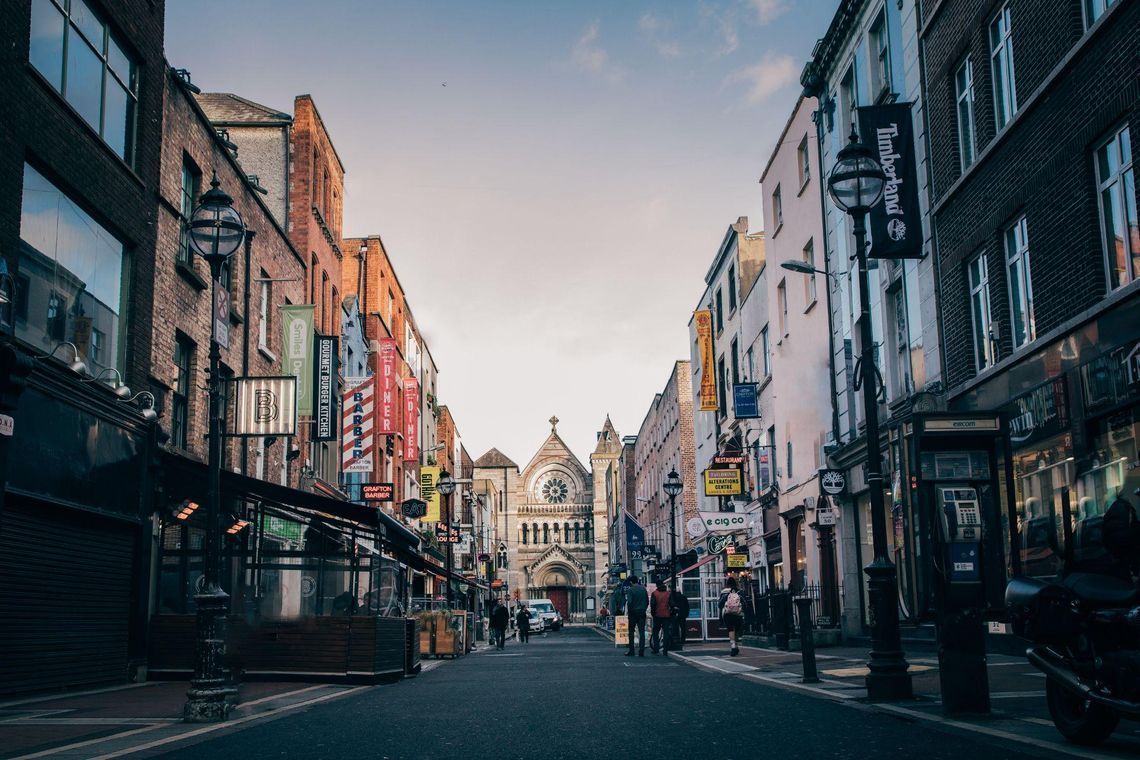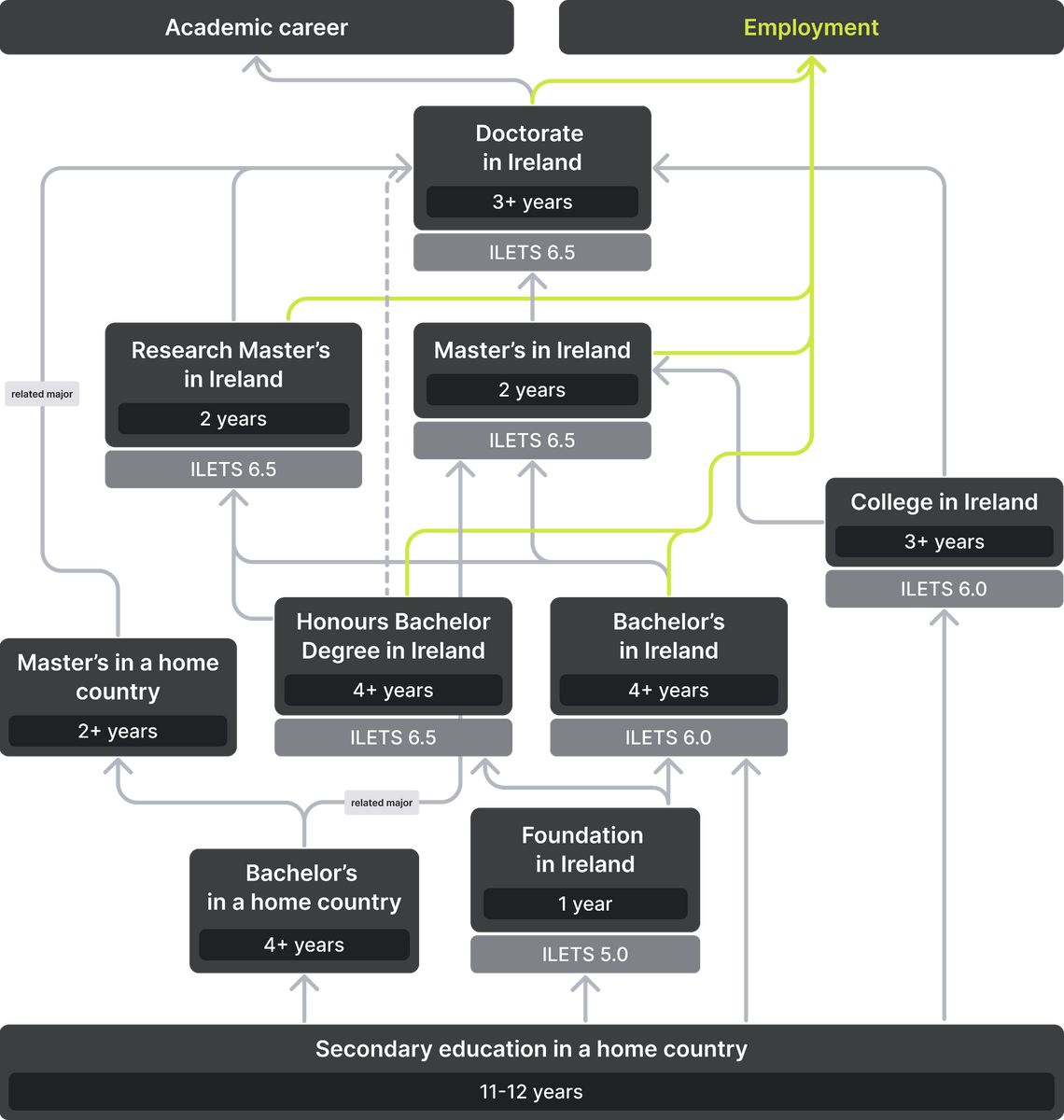Apply to a foreign university with confidence
- Properly fulfilled documents
- Perfect motivation letter
- Support from a personal mentor
- Offers from several universities
Education in Ireland can easily rival the British one. Read about Irish higher education in our article: everything from admission process and tuition fees to visa application and scholarships.
Free consultation



School education in Ireland is compulsory for children from the age of 6, but it is possible to start at the age of 4. Primary education is usually funded by the state but belongs to church communities. At the same time, the study of religion is not included in the curriculum.
Teenagers enter post-primary education at the age of 12. At this stage, students can choose a school with a specific inclination: academic (Voluntary secondary schools), applied (Vocational schools and community colleges), or mixed type (Community and comprehensive schools). After 3 years of high school, students take exams and receive a Junior Certificate.
High school (senior cycle) is not required if there are no plans to enter a university. Before taking the last two years, students can also take the Transition Year to rest or work. When moving to graduate classes, you also need to choose a training program. The type of secondary education certificate and the further trajectory of education depends on it. There are 3 options:
Also in Ireland, there are many private English-type boarding schools that are popular among international students, as they provide prestigious quality education and the opportunity to obtain international certificates. Such schools are cheaper than British ones: the cost starts at 11,300 USD per year.
Education in Ireland can easily rival the British one in quality and variety of research and applied programs, and in terms of tuition fees, the country clearly outperforms its neighbor. It doesn't matter whether a student chooses to study IT or agriculture — here any specialty is modern and adapted to the needs of the market. And the open and hospitable Irish people will make everyone feel like they belong on the emerald island.
Items 1-6 of 103
Advanced search| Education type | Age | Duration | Min. cost | Avg. cost | Language requirements |
|---|---|---|---|---|---|
| Summer camp | 9+ | 2-12 weeks | 678 USD/week | 904 USD/week | A1 — Elementary |
| Language courses | 14+ | 1-12 weeks | 192 USD/week | 282 USD/week | A1 — Elementary |
| Secondary education | 12+ | 6 years | 15,820 USD/year | 24,860 USD/year | B1 — Intermediate |
| Foundation | 17+ | 1-2 semesters | 12,430 USD/year | 16,950 USD/year | IELTS 5.0 |
| Bachelor's | 18+ | 4 years | Free | 19,775 USD/year | IELTS 6.0 |
| Master's | 20+ | 2 years | 4,520 USD | 20,905 USD/year | IELTS 6.5 |
| MBA | 20+ | 2 years | 9,040 USD/year | 21,470 USD/year | IELTS 6.5 |
| Doctoral | 20+ | 3 years | 4,520 USD | 10,000 USD/year | IELTS 6.5 |
| Item | Average cost |
| Language exam | 250 USD |
| Student visa | 113 USD |
| Insurance | 226 USD/year |
| Registration fee | 56 USD |
| Flight | 226 USD |
| Rent | 508 USD/month |
| Transportation | 113 USD/month |
| Meals | 203 USD/month |
| Study materials | 79 USD/month |


You can enter the majority of universities in Ireland after 11 or 12 years of secondary school. The certificate must have excellent grades in English and mathematics over the past 2-3 years. You will also need an IELTS (preferred) or TOEFL certificate. Some institutions may require non-EU applicants to complete a Foundation program or 1 university year in their home country, but this is rather an exception.
Third-country nationals submit documents directly to the chosen university, so the requirements should be checked with the admissions office of a particular university or college. Due to autonomy, the admission policy for foreigners may differ from institution to institution. EU and UK representatives apply through the Central Application Office.
Usually, universities have two application deadlines: an early one at the beginning of February and a standard one at the end of June. It is recommended to start preparing for admission a year before.
For bachelor's degree:
Additionally for master's and doctoral studies:
All documents and/or their copies must have a certified translation into English.

Irish organization NARIC is responsible for the recognition of foreign education certificates and their compliance with the Irish high school diploma (leaving certificate). As a rule, you can enter the universities of Ireland after grade 11 if that is your school system. However, local educational institutions have the right to take NARIC decisions as a recommendation and establish their own rules for admission of applicants: to take a Foundation program or complete 1 year of university in their home country.
Also, not all universities ask applicants from countries outside the EU to legalize a certificate or diploma — for some, a notarized translation into English is enough. However, Ireland is a part of the Hague Convention, so a university or college may require documents to be legalized with an apostille.
Foundation programs in Ireland
Foundation programs are widely available at universities and colleges in Ireland for international students. It is not mandatory to take such courses, but the administration of universities claims that Foundation graduates have a greater chance of admission, especially to prestigious institutions with high competition. In some cases, Foundation implies subsequent admission to a university or college upon successful completion of the course.
Educational institutions of the country almost always expect high academic results in mathematics and English from applicants. Therefore, preparatory programs are most often aimed at mastering the fundamentals of technical disciplines and/or training before passing the IELTS exam. The duration of Foundation studies can vary from 3 months to an entire academic year. The timing depends on the student's initial level of knowledge. Also, the universities of Ireland offer summer courses: during a long vacation, you can improve your English proficiency and/or study specialized subjects and at the same time get to know the university from the inside.
Colleges in Ireland can be affiliated with major universities. For example, University College Cork and University College Dublin, together with two other universities, formally form the National University of Ireland. Moreover, they all function as separate independent universities with their own leadership and campuses.
Colleges may be self-sufficient educational institutions, offering bachelor’s and master’s programs for both local and international students, just like any of the universities. The only difference is that colleges have a narrower focus and, accordingly, fewer programs. Most of these colleges in Ireland are private, but this does not always mean that the cost of studying in them is higher.
Further Education Colleges are aimed at early employment. They most often work at high schools under the Leaving Certificate Vocational Program. FE colleges do not accept foreigners.

There are 2 types of Bachelor's studies in Ireland. For the Ordinary Bachelor Degree (BA) the student must study for 3 years and gain 180 ECTS. Holders of Honours Bachelor Degree (BA Hons) often study for 4 years and gain 240 ECTS. The latter, as a rule, involves a larger volume of material, high standards of teaching, and full immersion in the academic aspects of the specialty. This degree is usually required for admission to the research master's degree, and sometimes even allows you to immediately go to a doctorate. The Honors Bachelor Degree holders also have more options for Post-graduate Diploma programs. This qualification stands between bachelor's and master's. It will take 1 year to get it.
Master's degree in Ireland, as in most European countries, lasts for 1-2 years, depending on the specialty. During this time, the student earns from 60 to 120 ECTS credits. There are 2 types of master's:

PhD programs in Ireland last 3-4 years. ECTS credits are awarded only for the taught elements (lectures and seminars), therefore there is no standard amount of credits at this level of education. As in the UK, doctoral students in Ireland are first awarded the title of Master of Philosophy (MPhil) and only after successfully passing all exams — a PhD degree.
The country's universities offer not only academic but also professional and practical doctoral programs. The latter implies the active interaction of the young researcher with business representatives, in which new technologies and solutions can be introduced. Also, the supervisor in this case does not have to be from the academic environment.
Foreigners who are not citizens of the European Union cannot study in Ireland for free. The total cost of education is quite high, however, many educational institutions and the government of the country offer various scholarships, grants, and discounts to foreign applicants. These payments cover up to 50-100% of the tuition fees. Most scholarships are awarded for academic excellence and scientific achievement, and funding opportunities for athletes and artists could often be found. People with disabilities and refugees with official status almost always receive financial aid.
The deadlines for applying for scholarships are set independently by each university. In some cases, the applicant automatically applies for funding, in others, a separate application is required. Also, universities award academic scholarships based on the results of the past academic year.

To enter Ireland non-EU/EEA students need to obtain a visa: short-term type C for visits up to 3 months and long-term type D for a longer stay. Visa processing costs about 113 USD and takes up to 8 weeks. Documents are submitted online. All of them must be in English or have a certified translation. Check details regarding fees, documents, and the whole application procedure for your country.
Upon arrival in Ireland, the student must obtain a temporary residence permit. To do this, you need to register with the Garda National Immigration Bureau and receive a GNIB-card, which is renewed once a year. You must first open an account with an Irish bank for at least 3,390 USD. The GNIB card does not work as a visa for leaving and re-entering the country — for this Re-Entry Visa is required. In addition, Ireland is not part of the Schengen area, so you will have to issue a separate document to travel to Europe.
The student visa allows students from overseas to work up to 20 hours a week during studies and full time during vacations. You do not need a separate permit for employment, but you will need to obtain a PPS number. Without it, the employer is not allowed to hire you. You also need an account with an Irish bank to where your salary will be transferred. The minimum wage in Ireland is 10 USD/hour. Typically, students receive up to 17 USD/hour working in the service sector or in junior office positions. Also, during their studies, many get an internship if it is not included in the compulsory program.
As for EU and EEA students, they are allowed to work in Ireland without any restrictions

In Ireland, there is a standard way to stay in the country after studies (Post Study Pathways). A bachelor's graduate may extend their stay in Ireland to find work for 1 year, Master's graduate — for 2 years. At the same time, the status of the temporary residence permit changes: from student (Stamp 2) to temporary residence permit (Stamp 1G). The total life expectancy in Ireland for study and job search must not exceed 7 years with a bachelor's degree and 8 years with a master's degree. Having found a suitable job, the candidate prepares a work permit at the Department of Jobs, Enterprise and Innovation, the fee is 339 USD. After 5 years of living in Ireland on a work visa, a person has the right to apply for citizenship.
60+ countries
we work with
$1,000,000 saved
by students through scholarships
6,400 offers
our students got